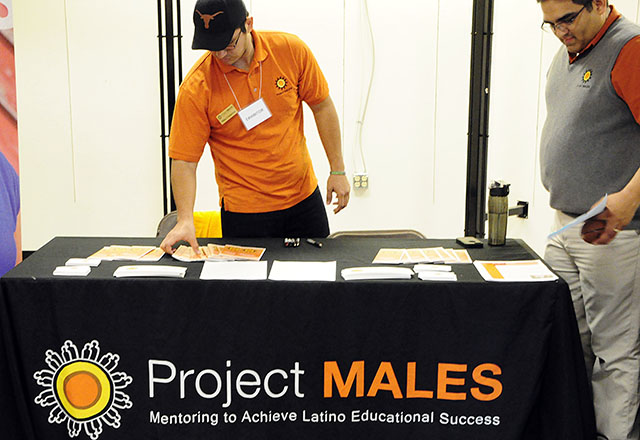Mentor Program Tries to Put More Latino Male Students on a Path Toward College

Mike Gutierrez and Victor Saenz participate in the Austin Independent School District’s Feria Para Aprender (Learning Fair). Photo by Oscar Ricardo Silva.
By Alyssa Sanchez
For Reporting Texas
Ricky Vazquez knows he’s one of the lucky ones. Both his parents went to college, and it was always in his future. He also knows that’s not the case with many young Latino men.
For the past few years, he has spent part of each week meeting with young Hispanic men at Austin high schools, trying to encourage them to consider college. They discuss what’s going on in their lives and what’s happening in school. Vazquez helps them work on issues such as time management and shares advice about how to get into college and succeed.
Vazquez, a 21-year-old University of Texas MPA student, is one of about 45 volunteer mentors in Project MALES, a program designed to encourage more Latino young men to consider college and to prepare them for it. The acronym stands for Mentoring to Achieve Latino Educational Success.
The mentors work with students at three Austin high schools – Lanier, Reagan and Travis – who are at risk of dropping out, Vazquez said. Students are assigned mentors through the dropout prevention program Communities in Schools.
The program, cofounded in 2010 by UT associate education Professor Victor Saenz and Luis Ponjuan, formerly at UT but now at Texas A&M, seeks to address the shortage of Latino men in college. While the number of Hispanics attending college has steadily increased, males have fallen behind.
In 2009, 60 percent of the degrees earned by Hispanics went to women, according to the National Center for Education Statistics. There’s another troubling gap: about 34 percent of Hispanic men between 18 and 24 have not completed a high school degree, compared to 21 percent of all men in that age group.
That gap has serious implications for Texas, where Hispanics are 38.2 percent of the population and growing.
“If half of the fastest-growing group in Texas (and nationally) is systematically lagging behind everyone else, this will have long-term consequences,” Saenz said in an email.
He said he started the program to put his research into action and to benefit the community.
Saenz’ research has identified several common reasons that young Hispanic men skip college. Many would rather go to work right from high school. College-educated role models are scant: many of their parents did not go to college and there are few male Hispanic teachers in high schools.
“Some come from a family where the dad either works all day or comes back late at night. The mom might stay at home to take care of the kids, and they don’t have anyone to really look up to,” Vazquez said. “The people that they do hang out with at school might be involved in the wrong things.”
Mentoring programs such as Project MALES give them a role model and a support network.
“The program shows them that the undergraduate mentors have gone through some of the same experiences they have,” said Mike Gutierrez, a mentor coordinator for the program. The mentors help give the students “hope that they can work hard, go to college and succeed.”
The program is still young, but organizers plan to find a way to track the mentees’ progress from beginning to graduation in order to improve results. It receives funding from the Texas Higher Education Coordinating board as well as from the Division of Diversity and Community Engagement at UT.
The project has partnered with Communities in Schools, an Austin-based dropout prevention initiative that works with more than 6,000 Central Texas public school students every year. The agency was looking for a way to expand its mentoring program for boys to include a higher education perspective.
CEO Suki Steinhauser said that every child needs a caring adult in his life and that students who are at risk of not graduating from high school might not be getting the adult attention they need. That’s where the mentors come in.
“We want to make sure everyone is getting the right kind of support,” she said. “Our goal is to make sure that every child is successful,” no matter what the demographic trends show.
Last year, they launched the Texas Consortium for Male Student Success. The consortium plans to create male-focused programs similar to the UT program across the state, starting with Texas State University, South Texas College in McAllen and the University of North Texas in Denton. The program has also added a new mentoring site this semester at the University of Texas Elementary School.
Ricky Vazquez, the college student, has worked with three mentees. One was a sophomore who was not yet ready to think about college. His most recent mentee, from Lanier, was a success story. He was accepted at Texas State University, but chose to attend Austin Community College, where his girlfriend is enrolled, Vazquez said.
Vazquez said more could be done to encourage the teenagers.
“It’s once a week for 30 minutes,” he said. “Why we don’t go more, I don’t know.” he said.
Reporting Texas updated this story on April 17, 2014, to correct Vasquez’s age and major.